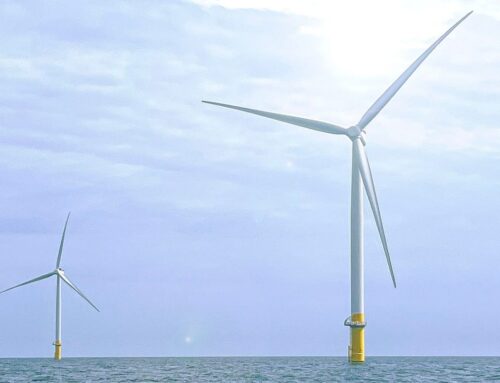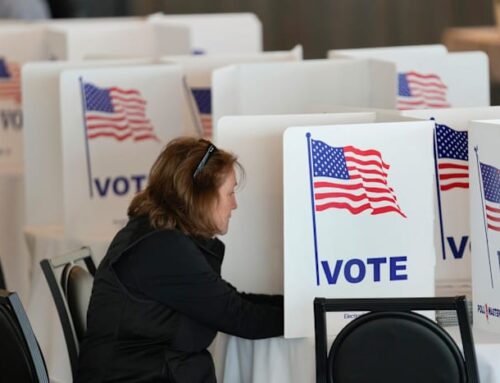Voters OK Ann Arbor sustainable energy proposal to supplement DTE service
November 6, 2024
ANN ARBOR, MI — Ann Arbor can go forward with creating a city-run sustainable energy utility after city voters approved the measure with 79% support in the Nov. 5 election.
With all precincts fully counted, the vote on Proposal A was 47,299 yes to 12,854 no.
“I’m incredibly excited about the opportunity of the sustainable energy utility,” Mayor Christopher Taylor said, calling it a groundbreaking proposal put forward by city staff and ratified by a community committed to taking action to fight climate change.
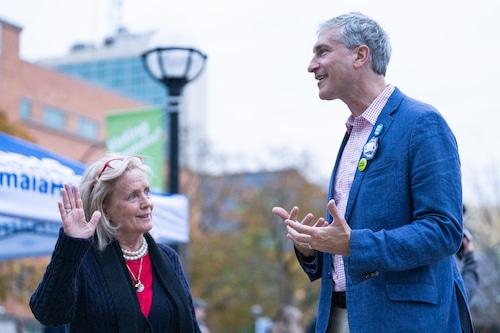
Ann Arbor Mayor Christopher Taylor and Congresswoman Debbie Dingell converse outside the University of Michigan Museum of Art polling center during Election Day in Ann Arbor on Tuesday, Nov. 5, 2024.Josh Boland | MLive.com
As part of the city’s A2Zero plan, the city wants to operate a city-run power utility to supplement DTE Energy service in the city with new investments in local renewable energy, with the aim of improving power reliability and reducing carbon emissions.
Once the utility is up and running, the city would become a provider of renewable energy to local residents and businesses under an opt-in model for those who choose to subscribe and want to pay for energy through the SEU, as it’s called.
The city’s aim is to provide 100% renewable energy from local solar and battery storage systems and networked geothermal systems installed at participating homes and businesses. City officials characterize it as an innovative model focusing almost exclusively on energy generation at the point of use.
“The SEU will enable community members to enjoy renewable, reliable energy at what we believe to be below-market prices,” Taylor said.
While it would be publicly owned, it’s short of the full-scale public takeover of DTE that grassroots group Ann Arbor for Public Power wants to see eventually. The city intends to further explore the bigger undertaking as a future possibility, recognizing it could cost the city hundreds of millions of dollars.
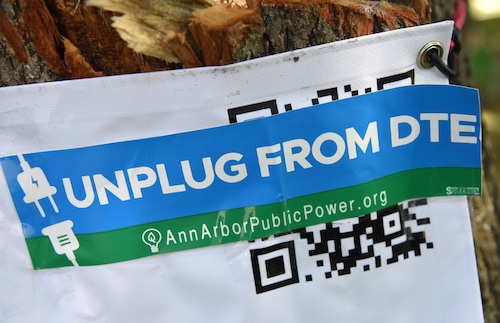
Ann Arbor for Public Power town hall at Burns Park on July 30, 2023. (Ryan Stanton | MLive.com)Ryan Stanton | The Ann Arbor News
Approval of the ballot proposal does not authorize the city to levy new taxes. Rather, residents and businesses have the choice whether to stick with DTE service or become SEU subscribers and pay SEU fees.
“No one will be required to take service from the SEU, but everyone will have the choice to participate in at least some of the SEU’s offerings,” the city website states. “By providing choices, we are diversifying our energy options and ensuring everyone has the opportunity to enjoy the benefits of clean, healthy energy systems.”
The city’s tentative plan is to seek financing to start making investments through the SEU once there are 20 megawatts of commitments from people interested in subscribing. The city has been asking people interested to fill out an online form.
The city hasn’t really pushed the waitlist yet, but there are about 200 households so far, said Missy Stults, the city’s sustainability director, who said more details are coming.
“We are honored and humbled with the trust that Ann Arbor voters put in the city to advance the sustainable energy utility,” Stults said. “With this passage, we move into the final design phase and begin recruitment.”
Stults said she can’t wait to engage with the public more as the city creates a truly local, sustainable and resilient energy system of the future.
The city has advertised the SEU would provide access to clean energy at rates cheaper than what DTE customers currently pay for “dirty electricity.” It also would offer energy storage solutions for less than the average cost of a whole-house generator, helping to make clean energy options affordable to more residents, according to the city.
A DTE representative said in May the company had no formal position on the proposal, but the company released a statement saying DTE is positioned to continue to support Ann Arbor’s clean energy goals and is executing a four-point plan to provide increasingly reliable service to city residents.
“DTE is investing $215 million in infrastructure improvements in Ann Arbor over the next five years, which will result in 30% fewer and 50% shorter outages,” the company stated. “Today, 30% of all electricity within the city of Ann Arbor can be attributed to DTE’s Michigan-made wind parks and solar farms and DTE continues to invest in cleaner electricity generation to meet the state of Michigan’s new clean and renewable energy goals — 60% renewable energy by 2035 and 100% clean energy by 2040.”
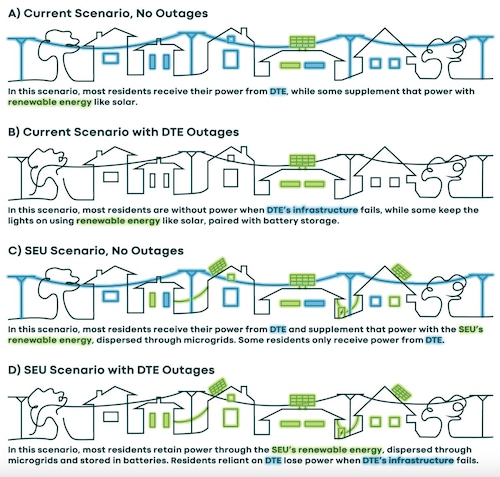
A city of Ann Arbor graphic showing how residents getting their power through the city’s proposed sustainable energy utility would maintain power with microgrids and energy stored in batteries even when the DTE Energy grid goes down.City of Ann Arbor
DTE cites a 2023 study saying partnering with DTE to achieve the city’s goals is the lowest-cost option for city residents. And moving forward with full municipalization of the local power grid as a possible next step beyond the SEU would be prohibitively expensive for residents, the company argues.
Ann Arbor takeover of DTE could cost city up to $1.15 billion, study finds
The city has information about the SEU proposal at a2gov.org/a2seu.
“Through a diverse mix of energy generation and the use of energy storage, subscribers to the SEU will still have power even when disasters disrupt the traditional energy grid,” the city website states, showing graphics illustrating examples of different SEU service scenarios.
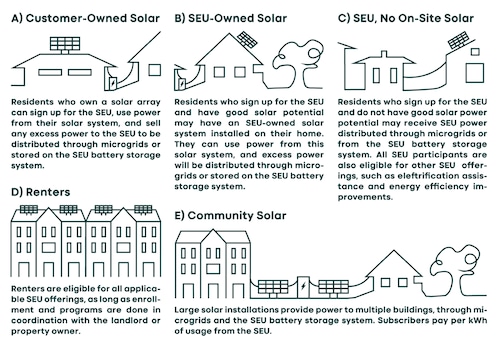
A city of Ann Arbor graphic showing different scenarios for the city’s proposed sustainable energy utility.City of Ann Arbor
It would allow for microgrids, sharing solar energy between neighboring households and businesses.
“Focusing on generating energy at the source of use minimizes the need for distribution systems (e.g., poles and wires), which are currently the most vulnerable part of the existing energy system,” the website states. “This means that SEU-generated energy will be more reliable (and resilient) than energy from a traditional utility.”
City voters on Tuesday also renewed the city’s parks millage for 20 years, while rejecting two election reform proposals.
Want more Ann Arbor-area news? Bookmark the local Ann Arbor news page or sign up for the free “3@3 Ann Arbor” daily newsletter.
Search
RECENT PRESS RELEASES
Related Post
